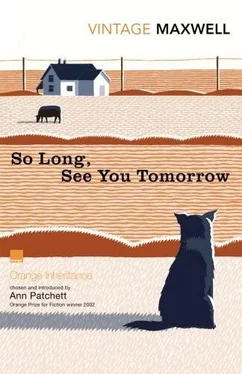"Thanks. How'd you like it if I did that to you?"
He doesn't really hold it against her and she doesn't look guilty. They both know it is just something she has to do because she is a dog. It is warm and dry in the barn and he soon stops shivering. He cleans out the stalls and puts down fresh hay for the horses and fills the water buckets, all the while enjoying the sight of the rain coming down on the plowed field beyond the open door.
In the night he gives Wayne a poke and says, "Move over, you're crowding me out of bed." Sometimes Cletus jabbers in his sleep. Mostly they lie curled together in what is not a very large bed sleeping the sleep of stones. The north wind howling around the corner of the house only serves to deepen this unknowing.
Dressing for church Clarence Smith puts on a clean white shirt and discovers that Fern hasn't washed his collars. And is angry with her. He has his duties to perform and she has hers, one of which is to see that he has clean clothes to put on.
The small country church is packed with his neighbors, all of whom are wearing clean collars. The giving out of the hymn number causes them to rise and add the droning of their country voices to the wheezing of the little organ. Since the preacher said that the point of the parables is mysterious and needs explaining, they have no choice but to believe him. The details — the great supper, the lost lamb, the unproductive vineyard, the unjust steward, the sower, and the seed sown secretly — they are familiar with and understand. Above the transparent dome they live and work under there is another even grander where they will reside in mansions waiting to receive them when they are done with farming forever.
What Clarence Smith sees as he helps his wife into the front seat of the buggy after church is a woman who in the sight of God is his lawfully wedded wife and owes him love, honor, and obedience. Other people, with nothing at stake, see that there is a look of sadness about her, as if she lives too much in the past or perhaps expects more of life than is reasonable.
Though he had brothers he was on good terms with, the person he turned to for companionship or when he had something weighing on his mind was the overserious man on the neighboring farm. After twelve years he found it hard to believe there had ever been a time when he and Clarence weren't friends. At night, in the immense darkness, the only light he could see came from the Smiths' house.
He remembered the day they came. A raw, wet, windy day in March. He was plowing next to the road when he saw an unfamiliar wagon piled high with stuff drive up the lane at Colonel Dowling's, and he threw the reins over the horse's neck and started across the fields. When he got to the house, the front door was unlocked and standing open but the new neighbors were still outside, looking around to see where they were — the man a little under average height, and a young woman with a baby. They'd been on the road since daybreak. They couldn't have been thirty yet, either of them, but already there were wrinkles in the man's forehead and at the corners of his eyes. His voice was low, and if he could indicate something by a gesture instead of speech, he did. And what crossed Lloyd Wilson's mind was how defenseless he seemed.
Saying "Easy. . easy. . now your side… a little more. . more… a little more," the two men maneuvered a heavy wardrobe up the stairs and through a narrow doorway. You didn't have to be much of a judge of character to see that the woman had been hoping for something better and the man was being patient with her. She didn't seem to know what to do first. Brought up in town, he said to himself. And then, noticing how small her wrists were: "Here, ma'am, let me have that. It's too heavy for a woman to carry." As he handled their furniture and their crockery, and box after box of possessions they hadn't been able to part with, he found out things about them, that first day, that it would have taken him years to discover under ordinary circumstances. Poking the baby's stomach gently with his forefinger, he produced a smile. "Two of my own," he said as he turned away. He came upon the woman standing forlornly in the midst of a kitchen that had been stripped of everything, including the stove, and said, "My wife is expecting you folks for supper." She wasn't, but no matter. And anyways, they knew she couldn't be expecting them because nobody knew they were coming. When the others sat down to eat, Fern nursed her baby in the rocking chair in the parlor. Afterward, he walked the new neighbors back to their house and waited till they had lit the lamps.
In the county clerk's platbook the hundred and sixty acres that Lloyd Wilson farmed were listed as belonging to Mrs. Mildred Stroud. It did not trouble him, or at least it did not trouble him very much, that the cows were his and the grass they cropped was not. The rent he had to pay on the pasture acreage was not unreasonable. His father had had the place before him and had saved up enough money over the years so that when his health failed and he had to give up farming he could live out his days in town.
Mrs. Stroud was a woman in her early fifties with two unmarried daughters who lived at home and were kept in the dark about her financial affairs, as she had been kept in the dark about her husband’s — until he died suddenly and the president of the bank began to explain things to her. He started in as though speaking to a child and then had to pull himself up short. It had been his fixed opinion that all women are ignorant about money matters, but this woman didn’t happen to be, and the questions she put to him were just the questions he would have preferred not to answer. It was quite impossible to take advantage of her. Inadvertent mistakes didn’t escape her notice either. Like most extremely clever people, she underestimated the intelligence of others. She could have remarried and chose not to because it would have meant discussing what she did with her money.
She appeared at her farm frequently and without giving her tenant any warning. If she did that, what would have been the point in her coming? When she pitched in to Lloyd Wilson for some piece of slackness, he cleared his throat and moistened his lips, as if he was about to argue with her, but instead he turned away, pretending that something a few feet to the right or left of them had engaged his attention at the moment. At other times, cap in hand, he was overly polite, in a way that could be taken for rudeness, but that she simply ignored. She knew, because she had made it her business to know everything about him, that if he hadn’t got his corn in by the time he should have it was probably because he was off planting somebody else’s corn — some neighbor who wasn’t able to do it himself. She could have made an issue of this and didn’t. In the end her corn got planted and she was never actually out of pocket. It was the principle of the thing that she objected to. As her tenant his first responsibility ought to be her. If she didn’t like the way he farmed she could ask him to leave and put some other tenant on the place instead, but they both knew that this wasn't about to happen.
The secret that Mildred Stroud managed to keep from him, though not from herself, was that she found him physically attractive. But she was fifteen years older than he was, and, knowing the cruelty of Lincoln gossip, didn't choose to be the subject of it. And anyway it was out of the question.
Chewing on a grass blade, he remarked — this was in the days when he and Clarence were still friends and he could say whatever came into his head, knowing it wouldn't be repeated or misunderstood—"A good wife is a woman who is always tired, suffers from backache and headaches, and moves away from her husband in bed because she doesn't want any more children." And Clarence supposed that it wasn't just any good wife he was speaking of.
Читать дальше












